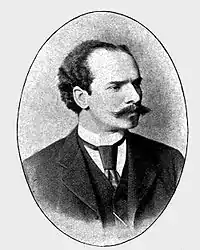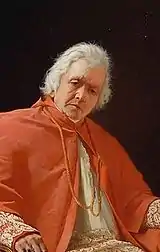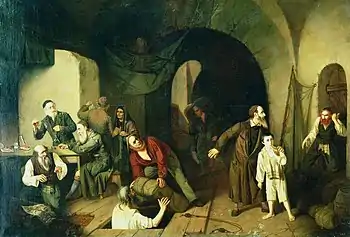Alexander Rizzoni
Alexander Antonovich Rizzoni, or Alessandro Rizzoni (Russian: Александр Антонович Риццони; 4 February 1836, in Riga – 29 April 1902, in Rome) was a Russian-Italian painter of portraits and genre scenes; mostly on Catholic themes.
Alexander Rizzoni | |
|---|---|
 Alexander Rizzoni (late 1860s) | |
| Born | February 4, 1836 |
| Died | April 29, 1902 (aged 66) |
| Education | Member Academy of Arts (1866) Professor by rank (1868) |
| Alma mater | Imperial Academy of Arts |
| Known for | Painting |
| Awards | |
Biography
He was born to an Italian family of artisans; originally from Bologna. He received his first lessons from his brother Pavel, who was also an artist.[1] In 1852, he enrolled at the Imperial Academy of Arts, where he studied with Bogdan Willewalde. Five years later, he was awarded two silver medals for his work.

That same year, he made a study trip to Italy and France, at his own expense. When he returned in 1860, he received a gold medal for his painting "Jewish Smugglers", which might now be perceived as somewhat Anti-Semitic although, judging by his later works, he harbored no such sentiment.
After that, he travelled again, to Spain and Belgium and, when he returned in 1862, received another gold medal along with a stipend that allowed him to continue his studies abroad.[1]
He spent four years in Paris and Rome, where he painted portraits of the Catholic clergy, scenes from folk life, and interiors of church buildings and synagogues. In 1866, he showed eight of these paintings in Saint Petersburg, earning the title of "Academician" and an extension of his stipend. Two years later, he showed more works and was named a Professor.[1]
When his stipend expired, he chose to stay in Rome, but continued to exhibit in Saint Petersburg. He also helped acquire paintings for the Tretyakov Gallery and the collector, Bogdan Khanenko. From this point on, his works dealt almost exclusively with the Catholic Church; plus some portraits of young women. His paintings are notable for their attention to details in the environment and costume, but are considered somewhat sentimental. Non-Catholic commentators in Russia were also concerned with his lack of "critical detachment".

An extremely harsh article appeared in the June, 1901 edition of Мир искусства (World of Art) calling him the "worst of all modern artists", a disgrace to Russian art, and suggesting that all of his works be thrown away; an attack that was probably related to his subject matter and loyalties, rather than artistic quality. After that, and some similar follow-up criticisms, he fell into a depression and committed suicide the following year.[2]
In 1990, one of his paintings, "The Italian Shop", was among a dozen stolen from the Serpukhov Historical and Art Museum. It was recovered in 2010, after being found in a private collection.[3]
References
- Brief biography @ Russian painting.
- Excerpt from Творчество Врубеля by Dora Zinovevna Kogan @ Vrubel World.
- "A Masterpiece with a Criminal Record" from Literaturnaya Gazeta
External links
![]() Media related to Alexander Rizzoni at Wikimedia Commons
Media related to Alexander Rizzoni at Wikimedia Commons